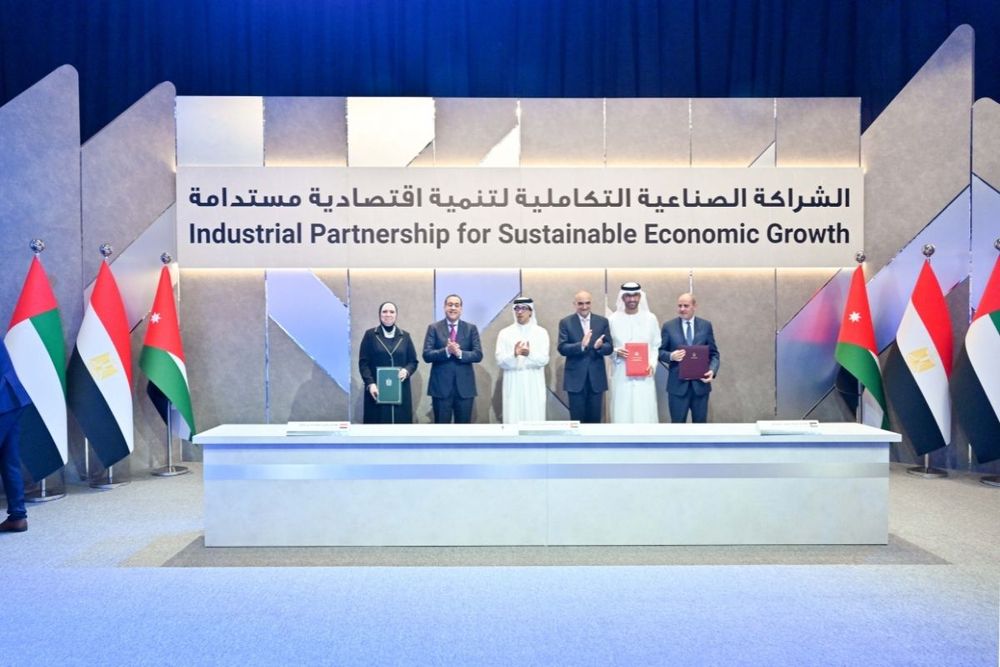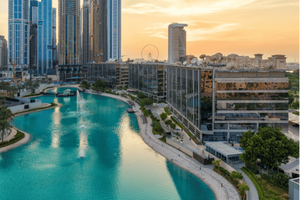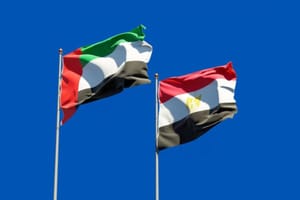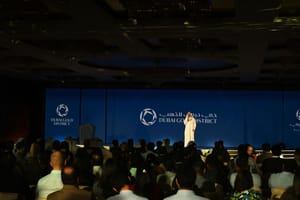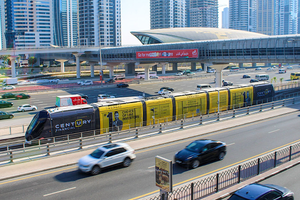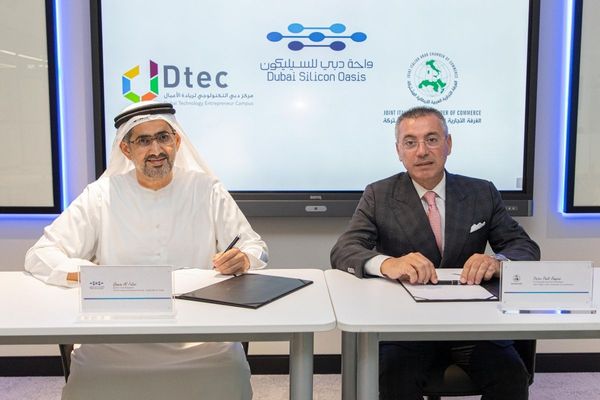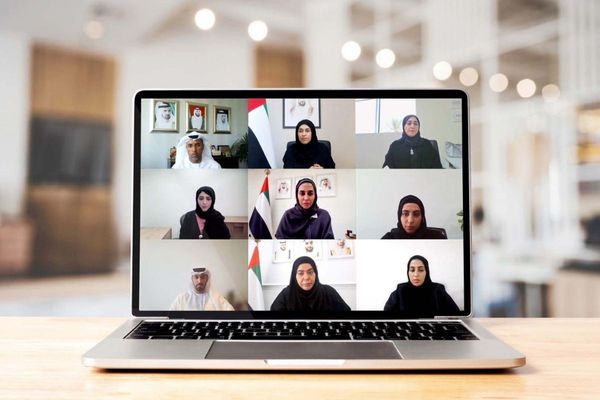The United Arab Emirates, the Arab Republic of Egypt and the Hashemite Kingdom of Jordan announced an Industrial Partnership for Sustainable Economic Growth yesterday, 29th May, 2022 to unlock new industrial opportunities and enhance sustainable economic growth in the three countries, across 5 sectors.
H.H. Sheikh Mansour bin Zayed Al Nahyan, Deputy Prime Minister and Minister of Presidential Affairs, witnessed the signing of the partnership, which is designed to achieve sustainable economic growth across food and agriculture, fertilisers, pharmaceuticals, textiles, minerals, and petrochemicals.
In order to accelerate the partnership objectives, a US$10bn investment fund has been allocated and will be managed by ADQ Holding.
Dr. Mostafa Madbouly, Prime Minister of Egypt, and Dr. Bisher Al Khasawneh, Prime Minister of Jordan, witnessed the signing alongside His Highness.
The partnership agreement was signed by Dr. Sultan bin Ahmed Al Jaber, Minister of Industry and Advanced Technology, Dr. Nevein Gamea, Egyptian Minister of Industry and Trade, and Yousef Al Shamali, Jordan Minister of Industry, Trade and Supply.
H.H. Sheikh Mansour bin Zayed Al Nahyan stated:
"The partnership embodies the vision of President His Highness Sheikh Mohamed bin Zayed Al Nahyan, to enhance industrial integration with Arab nations and the rest of the world so we can achieve a major leap in the industrial sector and transform its potential an economic driver. Industry is the backbone of the world’s largest economies. Through its capabilities, effective policies and current focus on developing advanced technology and logistics infrastructure, we are confident that the UAE can build a global economic powerhouse by leveraging industrial partnerships across the region."
H.H. Sheikh Mansour added:
"Advancing the industrial sector in the UAE, Egypt and Jordan will help strengthen and diversify the economy in each nation and increase the contribution of industry to the national GDP. This partnership is also a testament to its signatories’ ability to strengthen their relations and introduce new projects and industries within an integrated industrial ecosystem, while unlocking promising opportunities for future generations."
The three nations who are party to this partnership have diverse resources and unique competitive advantages, including access to raw materials. In particular, they enjoy robust capabilities in the pharmaceutical industries, with clear ambition to develop and expand them further and increase their production capacity. They also wish to strengthen manufacturing capabilities in the steel, aluminum, petrochemicals and derivatives sectors.
The three nations’ combined industrial capacity represents around 26% of the total industrial capacity of the MENA region. These countries also enjoy a highly developed logistical infrastructure, including airports, ports and strategic transport corridors such as the Suez Canal; major companies with distinct capabilities in the main focus areas of the partnership; and access to capital and smart financing solutions. Almost half the total population of the partner countries comprising 122 million people are young people, who represent both a large market and an emerging workforce.
Dr. Bishr Al-Khasawneh delivered remarks at the signing ceremony highlighting that the partnership is a testament to the depth of the historic relationship between the 3 countries; emphasizing that that the partnership enhances integration, protects supply chains, empowers import substitution, and promotes sustainable economic development; all of which will result in economic growth, job creation and other benefits.
Dr. Al-Khasawneh thanked the leadership of the UAE for their efforts towards strengthening relations and economic cooperation in the region.
Al-Khasawneh said,
"The continued active interaction and coordination at the leadership level confirms the strength of these relations with the industrial sector at the center of the partnership. In Jordan, an attractive investment destination, industry contributes to 24% of the GDP, and account for 21% of the countries employment. Jordan exports to many countries around the world and is empowered by supportive laws and regulations.
Jordan is eager to expand its global trade as the world recovers from the Covid 19 pandemic and continues to address global challenges.
For his part, Egyptian Prime Minister Mostafa Madbouly thanked the leaders of Egypt, Jordan and the UAE for a significant partnership that embodies the depth of relations between the countries.
He stressed that the support of the leadership in the three nations facilitated effective consultations and discussions between the stakeholders and specialists, resulting in the conclusion of these important agreements.
Mostafa Madbouly said:
"The pandemic and the Russian-Ukrainian crises revealed beyond any doubt the need for integration between our Arab countries in a way that helps achieve the interests of our peoples in Egypt, the UAE and Jordan and could become the seed for a stronger and broader cooperation."
Dr. Madbouly stressed that the current regional and international conditions make it imperative for Arab countries to maximise opportunities for integration, especially since each country has its unique competitive advantage and its capabilities.
He added,
"The projects that have been agreed upon will create an added value for the three countries and will have a positive impact on national security, local industry, and supply chain activities. There will be a continuous follow-up to the implementation of these projects, facilitating procedures, and overcoming obstacles. We aim to quickly reap the benefits of these projects, especially as the first phase achieves many gains in terms of enhancing food and drug security. The projects will also attract foreign investment and provide job opportunities for our youth."
In his speech at the beginning of the signing ceremony, Dr. Sultan bin Ahmed Al Jaber, UAE Minister of Industry and Advanced Technology, said:
"In line with the directives of President His Highness Sheikh Mohamed bin Zayed Al Nahyan, the Ministry of Industry and Advanced Technology focuses on developing and empowering the industrial sector, enhancing its contribution to the GDP and on economic diversification."
He added,
"We extend an open invitation to our partners to support this collaboration by encouraging private sector participation, enhancing advanced technology applications, providing smart financing solutions, and opening markets to encourage the growth of the industrial sector in these and other countries."
He continued:
"In line with the directives of President His Highness Sheikh Mohamed bin Zayed Al Nahyan, and with the aim of accelerating the objectives of this partnership between the three nations, a US$10 billion investment fund has been allocated to accelerate the partnership objectives and will be managed by ADQ Holding."
Dr Al Jaber added:
"This partnership will contribute to strengthening relations and cooperation with our brothers in Jordan and Egypt, and are in line with the goals of the Principles of the 50 that were announced by the UAE with the aim of building a better future. Developing distinguished economic partnerships is one of the most important priorities of the UAE leadership and government. The partnership will help diversify our economies and promote growth by increasing the in-country value of industrial products, especially in priority industries such as petrochemicals, pharmaceuticals, agriculture, food, and others. Through collaboration across expertise and resources, we will be able to add industrial value and reduce production costs, create more jobs, and achieve positive results for all parties."
He concluded:
"This partnership reflects our efforts to build constructive development partnerships that enhance our national economies, promote sustainable economic growth, support the knowledge sharing, deepen integration of the unique advantages of each participating country, boost self-sufficiency, enhance food and health security, integrate value chains, and develop more joint industrial ventures."
During his remarks, Mohamed Hassan Al-Suwaidi, Managing Director and CEO of ADQ, said:
"In line with the directives of President His Highness Sheikh Mohamed bin Zayed Al Nahyan, the US10billion investment fund allocated and managed by the Abu Dhabi Holding Company will catalyse the projects identified in this partnership across the agreed sectors and will strengthen the economic infrastructure in the 3 countries.
He added:
"The allocation of this fund confirms ADQ's commitment to industrial investment, directly or through its portfolio of companies, to enhance and enable the partnership and achieve sustainable economic benefits for the three participating nations and their people and is aligned with our objective of solidifying the UAE and Abu Dhabi’s position as a leading global investment and partnership destination across various critical sectors; and particularly in the industrial sector."
Al-Suwaidi continued:
"ADQ is committed to driving further investments and infrastructure, specifically in the industrial sectors agreed to in this partnership, which are of vital importance and will enhance the industrial GDP contribution for all three countries and result in significant positive impact on their efforts of economic diversification and development as well as job creation in the years to come."
Industry is the backbone of economy The partnership is based on enhancing investment opportunities in each country’s industrial sector, developing the three nations’ human and natural capital, and exploring a collective consumer market that offers opportunities for both the local private sector and international investors. The partnership includes launching joint industrial projects between the countries to promote economic growth and industrial integration, achieve self-sufficiency, and integrate value chains across the UAE, Egypt and Jordan.
Regional and Global Industrial Partnerships The Integrated Industrial Partnership For Sustainable Economic Growth reflects the UAE’s commitment to creating key partnerships at the regional and global levels, especially in the industrial sector. This is in line with its vision to enhance the industrial sector’s role in the national economy, integrate advanced technology, and utilise the competitive advantages and capabilities of each country. This makes the UAE a leading global destination for the industries of the future and a hub that attracts the most prominent industries.
The partnership also embodies the close relations between the three countries, their common vision and mutual trust. This partnership provides a platform for cooperation in the future, and is based on the importance of integration and openness, and the shared commitment to developing the industrial sector, exchanging economic benefits, and utilizing human resources and experiences through the establishment of major joint industrial projects in more than one country.
Five Key Sectors Agriculture, Food and Fertilisers Food security is a key objective of this partnership. The participating countries possess all the key elements across the food value chain to scale up investment in fertilisers, cereal, animal protein, and food production capacity. The UAE, Egypt and Jordan have the required combination of renewables and mineral resources to produce the basic materials to ensure sustainable development. Egypt, for instance, enjoys a global leading position as a producer and processor of food and agricultural processes that can meet the growing needs of the populations.
The Jordan Valley is blessed with diversity of agricultural areas, bio-climatic and environmental conditions, and a variety of agricultural products with high technical specifications, thanks to the application of modern production technology. The innovative technologies, fertiliser components and basic plastic products available in the UAE will be harnessed in agriculture and irrigation, with recent cross-border transactions reflecting these sectors’ growing strength and influence.
The industry is characterised by skilled labor, innovation, and high regulatory and production standards. The partnership will leverage the UAE’s chemical inputs, its manufacturing capabilities and storage and distribution facilities. It will also capitalize on Egypt’s pharmaceutical mega projects to build the largest pharma manufacturing center in MENA, in addition to leveraging Egypt’s considerable market size and access to a large pool of trained doctors, pharmacists, engineers and skilled technicians.
Jordan has a significant expertise in areas such as small molecule manufacturing, in addition to its global competitiveness and reach, with its products reaching 90 countries across the globe. The partnership also seeks to benefit from the increasing development of the UAE in the pharmaceutical sector, which exports medicines to 48 countries.
Supreme Committee and Executive Committee Under the partnership, a tripartite supreme committee, headed by the signing ministers, will be established. In addition, there will be an executive committee composed of undersecretaries of the ministries and representatives from relevant authorities and sectors. This committee will work with the private sector to increase opportunities, and the participating nations will identify the stakeholders and the courses of action required to achieve the objectives of these partnerships.
The committee will also review achieved progress, facilitate and supervise cooperation, and consider next steps and new projects of the strategic economic partnership. It will accelerate the introduction of economically viable opportunities and coordinate the pool of private-sector participants.
Essential industrial exports The UAE's main exports are oil and gas, plastics, rubber, foodstuffs, chemical industries, metal industries, and building materials. Egypt exports gold, gas, electrical wiring, iron, textiles, and citrus fruits, while Jordan’s principal exports are phosphates, potassium fertilizers, medicines and metals.
The combined capacity of the three countries constitutes about 22 percent of the gross domestic product of the Middle East and North Africa, worth about US$765 billion according to World Bank statistics in 2019. The trade bloc of the three countries ranks 14th in terms of the value of exports to the world, which stand at US$419 billion, while imports total US$380 billion, which represents substantial opportunities for the growth of manufacturing integrated products in the three countries.
From the UAE side, the signing ceremony was attended by: Sarah Al Amiri, UAE Minister of State for Public Education and Future Technology; and Dr. Thani bin Ahmed Al Zeyoudi, Minister of State for Foreign Trade.
They were joined by numerous officials, including:
Mohamed Al Shorafa Al Hammadi, Chairman of the Department of Economic Development – Abu Dhabi; Maryam Al Kaabi, UAE Ambassador to Egypt; Omar Suwaina Al Suwaidi, Undersecretary at the Ministry of Industry and Advanced Technology (MoIAT); Mohamed Hassan Alsuwaidi, CEO of ADQ; Abdullah Mohamed Al Mazrui, Chairman of the Federation of the UAE Chamber of Commerce and Industry; Mohammed Saif Al Suwaidi, Director General of Abu Dhabi Fund for Development; Khaled Salmeen is the Executive Director of Downstream Industry, Marketing and Trading at the Abu Dhabi National Oil Company (ADNOC); Khadim Al Darei, Chairman of the Egyptian-UAE Business Council; Jamal Saif Al Jarwan, Secretary General of UAE International Investors Council; and Ahmed Mohamed Al Naqbi, CEO of Emirates Development Bank.
Also in attendance were Abdullah Al Shamsi, Assistant Undersecretary for Industry Growth at MoIAT; Osama Amir Fadhel, Assistant Undersecretary for Industry Accelerators at MoIAT; alongside a number of experts and specialists in the industrial and manufacturing sector.
From Egypt’s side, the ceremony was attended by Al-Sayed Al Quseir, Minister of Agriculture and Land Reclamation; Dr. Hala Al-Saeed, Minister of Planning and Economic Development; Dr. Tamer Essam, Chairman of the Egyptian Drug Authority; Counselor Mohamed Abdel-Wahab, CEO of the General Authority for Investment; Engineer Ayman Al-Suwaidi, Chairman of the Federation of Egyptian Industries; Ayman Soliman, CEO of the Sovereign Fund of Egypt, and a number of officials.
From Jordan’s side, the signing was attended by Dana Al-Zoubi, Secretary-General of the Ministry of Industry, Trade and Supply; Zaher Al-Qatarneh, Secretary-General of the Ministry of Investment; Kholoud Al-Saqqaf, CEO and Vice-Chairman of the Social Security Investment Fund; Nassar Al-Habashneh, Jordan’s Ambassador to the UAE, in addition to the Chairman of the Chamber of Industry, Chairman of the Chamber of Commerce, Chairman of Amman’s Chamber of Commerce, Chairman of Amman’s Chamber of Industry, and a number of officials.
News Source: Emirates News Agency
